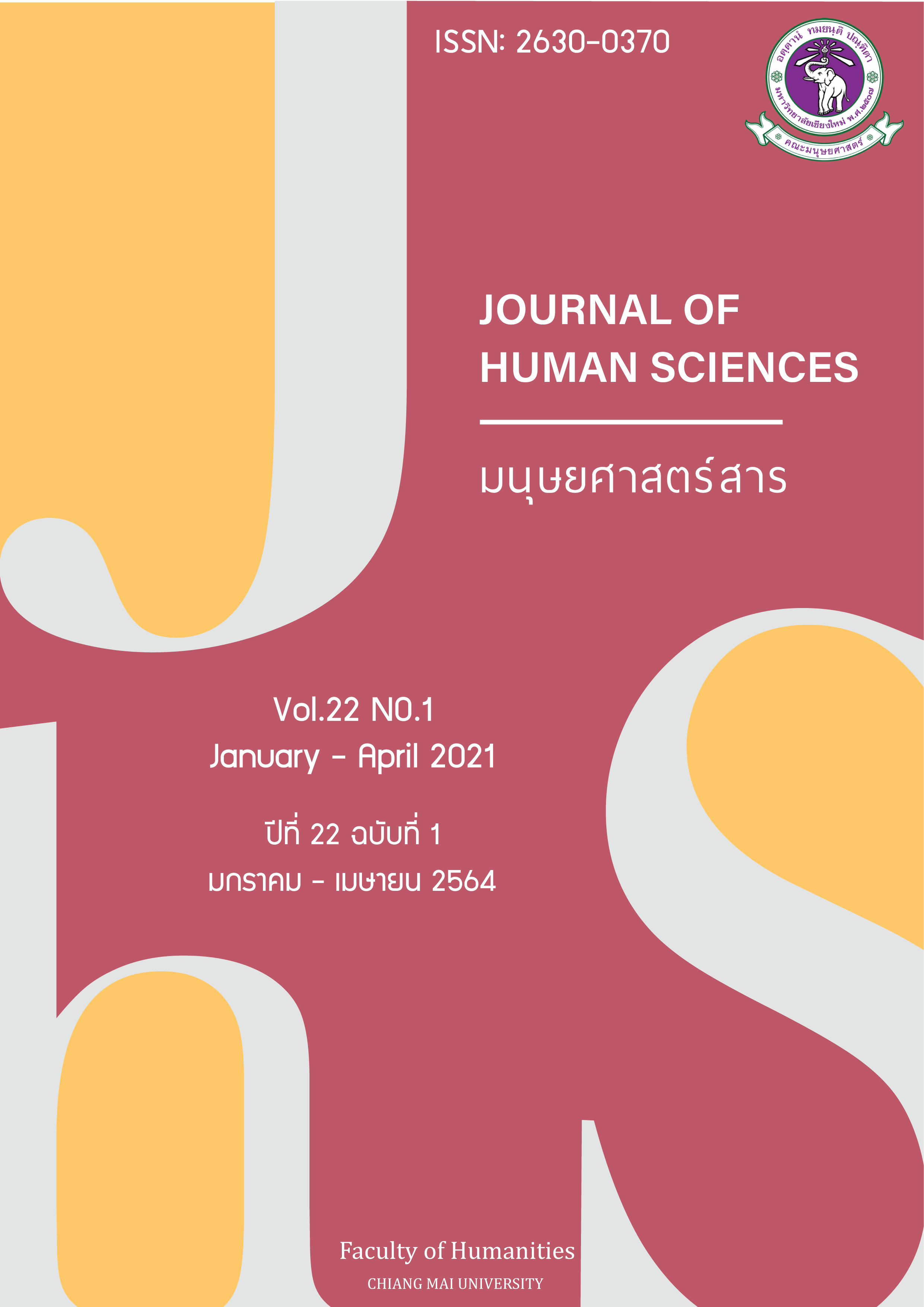ชายชาติทหารกับชาติในนวนิยายยาโออิเรื่อง นิทานพันดาว
Main Article Content
บทคัดย่อ
บทความวิจัยนี้มุ่งศึกษานวนิยายเรื่อง นิทานพันดาว ของ Bacteria (2016) โดยเน้นการสร้างความเป็นชายชาติทหารกับความเป็นชาติภายในระบบสื่อความหมายของนวนิยายโรมานซ์ทหาร ผลการศึกษาพบว่า ความเป็นชายชาติทหารประกอบสร้างผ่านความเป็นชายในเครื่องแบบ ร่างกำยำที่เย้ายวนใจผสานกับความเป็นแอลฟาผู้ปกป้อง ความเป็นชายชาติทหารในนวนิยายขนานไปกับการขยายตัวของกระแสทหารนิยมในวัฒนธรรมประชานิยมหลังการรัฐประหารใน พ.ศ.2557 ส่วนความหมายของชาติผนึกกับร่างกายของนายเอกที่เปราะบางและเรียกร้องการปกป้องคุ้มครองโดยทหาร ประกอบเข้ากับขนบความรักเทิดทูนในนวนิยายโรมานซ์ที่ขับเน้นความภักดีของพระเอกต่อสถาบันประจำชาติ การสร้างความเป็นชายชาติทหารและชาติในนวนิยายเรื่องนี้ยังคงนำเสนอความเป็นอื่นของชายแดนและกลุ่มชาติพันธุ์ผ่านคู่ตรงข้ามระหว่างเมืองกับชนบท นอกจากนั้น แผ่นดินชนบทที่มีเพศยังทำให้นายเอกพลิกความหมายจากความเป็นหญิงเชิงภูมิกายามาสู่ความเป็นชายที่มีอำนาจเหนือกว่าโลกชนบทที่ผูกอยู่กับความเป็นอื่นในแง่ชาติพันธุ์ ความเป็นหญิง และความไร้เดียงสาอย่างเด็ก
Article Details
เอกสารอ้างอิง
Bacteria. (2016). Nithan phan dao [A tale of thousand stars]. Bangkok: Nabu.
Bacteria. (2019). Nithan phan dao special [A tale of thousand stars: Special]. Bangkok: Nabu.
Bahk, E. J. (2016). Thai PM calls on people to watch ‘Descendants of the Sun’. Retrieved from https://www.koreatimes.co.kr/www/news/culture/2016/03/386200662.html
Bunyasaranai, P. (2003). Chon phao akha: phaplak thi thuk sang hai sokkaprok lalang tae duengdut chai [Akha: The Images of derogatoriness and underdevelopment but entailed by spectacularity]. In P. Laungaramsri (Ed.), Attalak chatphan lae khwam pen chai kop [Identity, Ethnicity, and Marginality] (pp. 81-115). Bangkok: Princess Maha Chakri Sirindhorn Anthropology Centre.
Crane-Seeber, J. P. (2016). Sexy warriors: the politics and pleasures of submission to the state. Critical Military Studies, 2(1-2). 41-55.
Crane-Seeber, J. P. (2020). On pleasures, fantasies, and soldiers: a reply to Catto’s critique. Critical Military Studies, 6(1). 96-104.
Jarmakani, A. (2015). An imperialist love story: Desert romances and the war on terror. NY:
New York University Press
Jang, K. (2019). Between soft power and propaganda: The Korean military drama Descendants of the Sun. Journal of War & Culture Studies, 12(1). 24-36.
Kemble, J. (2012). Patriotism, passion, and PTSD: The critique of war in popular romance fiction. In S. S. G. Franz & E. M. Selinger (Eds.), New approaches to popular romance fiction: Critical essays (pp. 153-177). Jefferson, NC: McFarland & Company.
Kham Phaka. (2014). “Comments from a common slut”: (Post)feminism perspectives in the analysis of the modern Thai novel. In R. V. Harrison (Ed.), Disturbing convention: Decentering Thai literary culture (pp. 169-191). London: Rowman & Littlefield.
Kitchen, V. (2018). Veterans and military masculinity in popular romance fiction. Critical Military Studies, 4(1). 34-51.
Kittimahacharoen, S. (2012). Chak assawin su suphap burut: chak victorian su siam [From knight to gentleman: From Victorian world to Siam]. In S. Chotiudompant (Ed.), Sat haeng wannakhadi kue trisilpa: Thrissadi sunthariya sangkhom [The art of literature is Trisilpa: Theory, aesthetics, and society] (pp. 233-256). Bangkok: Centre for Literary Studies, Faculty of Arts, Chulalongkorn University.
Matichon Online, (2016, March 19). Mai chai khae big tu tae dara ko hit ‘Descendants of the Sun’ theam mano pen phra nang yang narak [Not exclusively admired by Thai PM, Descendants of the Sun’s become megahit among Thai stars with cute cosplay inspired by the series]. Retrieved from https://www.matichon.co.th/entertainment/news75888
Pimsak, A. (2020). Attalak chairakchai lae kan ruesang nai nawaniyai wairun naew wai [Male homosexual identity and deconstruction in yaoi novels] (Doctoral thesis, Mahasarakham University).
Prasannam, N. (2019a). Yaoi phenomenon in Thailand and the fan/industry interaction. Plaridel: A Philippine Journal of Communication, Media, and Society, 16(2). 62-89.
Prasannam, N. (2019b). Nawanaiyai yaoi khong Thai: kan sueksa choeng wikhro [The Thai yaoi novel: An analytical study]. The National Library of Thailand Journal, 7(2). 16-34.
Ramsdell, K. (2012). Romance fiction: A guide to the genre (2nd ed.). Santa Barbara, CA: Libraries Unlimited.
Regis, P. (2003). A natural history of the romance novel. PA: University of Pennsylvania Press.
Royal Society of Thailand. Potchananukrom sap wannakam phim khrang thi 2 [Dictionary of Literary Terms (2nd ed.)]. Bangkok: Office of the Royal Society of Thailand.
Sudsapda.com. (2017). Jaek IG chai Thai nai khrueang baep the khanat ni yak dai!! [Here are IG accounts of Thai men in uniform. How handsome! Can’t resist!!]. Retrieved from https://sudsapda.com/men/41061.html
Sudsapda.com. (2018). Aep song hok num nai khrueang baep #numnaikhruaengnaploboktoduai [Peeking at 6 men in uniform #passhandsomemeninuniformforward]. Retrieved from https://sudsapda.com/men/90941.html
Thairath Online. (2016, 26 March). Di tuk lao! thahan Thai salat chut phrang show klam lam saep mai phae captain yu [All troops look fine! Thai soldiers take off their uniforms showing their ripped bodies. Captain Yoo Si-jin cannot easily beat them]. Retrieved from https://www.thairath.co.th/content/596740
Thairath Online. (2014, 20 May). Ma raeng saeng tuk krasae!! sisan ‘kot aiyakan suek’ tag hit lok social #thahan lo bok to duai!! (ton thi 1) [Martial law on the rise! The popular hashtag is breaking social media: #passhandsomesolidersforward (part 1)]. Retrieved from https://www.thairath.co.th/lifestyle/woman/424030
Thaitrakulpanich, A. (2015). Romancing the tanks: how military rom-com’s constant remakes since the ’70s legitimize coups. Retrieved from https://prachatai.com/english/node/5356
Thongthep, W. (2017, July 6). Niaw huachai sut kai puen: patibatkan chitwaitthaya la sut khong ko so cho? [Heart on the Trigger: A recent psychological operation by the National Council for Peace and Order?]. Retrieved from https://www.bbc.com/thai/thailand-40515748
Vespada, D. (2017). Khwamkhit doen thang lem 1 [The Odyssey of Thoughts Volume 1]. Bangkok: University of the Thai Chamber of Commerce.
Vichayawannakul, O. (2016). Phuying kap kan sang nawaniyai chai rak chai [Women and the
creation of Boys’ Love novels]. (Master’s thesis, Thammasat University).
Watanatup, S. (2013). Phap thaen khon rak phet diaw kan nai niyai Y jak sue internet [The representation of the homosexuals in Y novels on the internet]. (Master’s thesis, Thammasat University).
Winichakul, T. (2013). Kamneot Siam chak phaenti: prawattisat phumi kaya khong chat [Siam mapped: A history of the geo-body of a nation]. P. Pavakaphan, I. Arunwong & P. Phongwanan (trans.). Bangkok: Read.
Wongwet, S., Sriyabhaya, W., Ketthet, & Pakdeekham, S. (2020). Phetwithi khong tualakhon nai nawamiyai lak lai khwam niyom thang phetsarot [Sexualities of the characters in YAOI novels]. Wiwitwannasan, 4(2). 27-58.
Young, R. (1995). Colonial desire: Hybridity in theory, culture and race. NY: Routledge.


